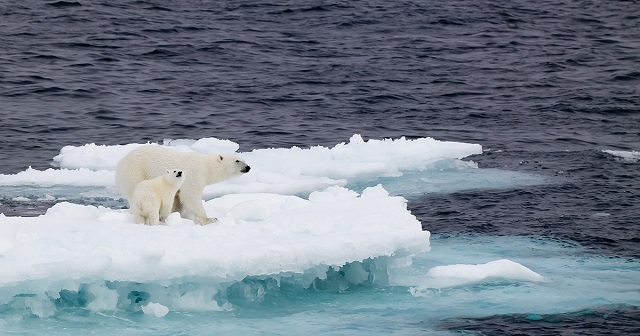Environment
Scientific Report Pours Cold Water On Major Talking Point Of Climate Activists

 From the Daily Caller News Foundation
From the Daily Caller News Foundation
The purveyors of climate doom will not tolerate the good news of our planet thriving because of modest warming and increasing atmospheric carbon dioxide. However, a recent scientific paper concludes that an optimistic vision for Earth and its inhabitants is nonetheless justified.
Widely accepted data show an overall greening of Earth resulting from a cycle of natural warming that began more than 300 years ago and from industrialization’s additions of CO2 that started in the 19th century and accelerated with vigorous economic activity following World War II.
Also attributed to these and other factors is record crop production, which now sustains 8 billion people—ten times the population prior to the Industrial Revolution. The boost in atmospheric CO2 since 1940 alone is linked to yield increases for corn, soybeans and wheat of 10%, 30% and 40%, respectively.
The positive contribution of carbon dioxide to the human condition should be cause for celebration, but this is more than demonizers of the gas can abide. Right on cue, narrators of a planet supposedly overheating from carbon dioxide began sensationalizing research findings that increased plant volume results in lower concentrations of nutrients in food.
“The potential health consequences are large, given that there are already billions of people around the world who don’t get enough protein, vitamins or other nutrients in their daily diet,” concluded the The New York Times, a reliable promoter of apocalypse forever. Among others chiming in have been The Lancet, Harvard T.H. Chan School of Public Health and the National Institutes of Health.
Of course, such yellow journalism lacks context and countervailing facts —elements provided in “Nutritive Value of Plants Growing in Enhanced CO2 Concentrations” published by the CO2 Coalition, Arlington, Virginia.
Any deficiency of nutrients from the enhancement of plant growth by elevated carbon dioxide “are small, compared to the nutrient shortages that agriculture and livestock routinely face because of natural phenomena, such as severe soil fertility differences, nutrient dilution in plants due to rainfall or irrigation and even aging of crops,” says the paper.
And while there is evidence of marginal decreases in some nutrients, data also show that higher levels of CO2 “may enhance certain groups of health-promoting phytochemicals in food crops” that serve as antioxidants and anti-inflammatory compounds, says the paper, which lists seven authors and more than 100 references. The lead author is Albrecht Glatzle, a member of the Rural Association of Paraguay and a former international researcher of plant and animal nutrition.
Among other points made by the paper are the following: Throughout a majority of geological history, atmospheric CO2 concentrations have been several times higher than today’s, which are less than optimum for most plants; atmospheric warming from even a quadrupling of CO2 concentrations would be small compared to natural temperature fluctuations since the last glacial advance more than 10,000 years ago.
Having virtually no scientific basis, the “green” movement’s hostility to carbon dioxide seemingly ignores the gas’s critical role as a plant food. As the paper notes, “CO2 is the only source of the chemical element carbon for all life on Earth, be it for plants, animals or fungi and bacteria — through photosynthesis and food chains.”
The so-called greenhouse effect of carbon dioxide— perversely exaggerated to support climate fearmongering— is a life-saving temperature moderator that keeps Earth from freezing over.
The obvious benefits of CO2 is “an embarrassment to the large and profitable movement to ‘save the planet’ from ‘carbon pollution,’” write the authors. “If CO2 greatly benefits agriculture and forestry and has a small, benign effect on climate, it is not a pollutant at all.
More CO2 is good news. It’s not that complicated.
Gregory Wrightstone is a geologist; executive director of the CO2 Coalition, Arlington, Va.; author of “Inconvenient Facts: The Science That Al Gore Doesn’t Want You to Know” and “A Very Convenient Warming: How modest warming and more CO2 are benefiting humanity” and a co-author of “Nutritive Value of Plants Growing in Enhanced CO2 Concentrations.”
The views and opinions expressed in this commentary are those of the author and do not reflect the official position of the Daily Caller News Foundation.
Business
Corporate Canada betrayed capitalism. Now it has been betrayed

From the Fraser Institute
By Bruce Pardy
The original Battlestar Galactica, a campy space opera, debuted on network television in 1978. Canadian actor John Colicos played the traitor Baltar, who helps robot Cylons ambush human civilization. After humans have been almost wiped out, Baltar is hauled before the Cylons’ Imperious Leader. “What of our bargain?!” Baltar demands. “My colony was to be spared!” The Leader says he has altered the bargain. “How can you change one side of a bargain?!” Baltar spits, not getting it. “When there is no other side,” the robot tells him, “You have missed the entire point of the war. There can be no survivors.” “Surely,” Baltar stammers, finally understanding, “you don’t mean me.”
Corporate Canada should know the feeling. After years of colluding with climate hysteria and betraying capitalism, Canadian companies have been dumped at the curb.
On June 20, Bill C-59 received Royal Assent. It’s a hodgepodge bill of humdrum provisions, hundreds of pages long, related to last year’s spring federal budget and fall economic statement. But buried in the stack are two sections that prohibit “greenwashing.” Businesses cannot claim that their products or practices help to protect against climate change or provide other environmental benefits unless they can prove the claims are true. The provisions amend the Competition Act and make climate and other environmental claims subject to the same regulatory regime as false advertising.
Companies and industry associations have taken down climate pledges and environmental commitments from their websites and social media. “Ottawa’s ban on ‘greenwashing’ has already put a chill on climate disclosure targets,” objected Deborah Yedlin, president and CEO of the Calgary Chamber of Commerce, in a commentary for CTV. It will affect the entire economy, she wrote, add bureaucratic burden, halt investment, and weigh on Canada’s sagging productivity. Corporate Canada has lost its climate bargain.
Over the course of decades, Western countries, but nowhere more than Canada, have undergone a cultural revolution. Accelerating climate activism, aggressive social justice ideology and managerial government have changed the landscape. Business elites, instead of defending capitalism, competition, open markets, the rule of law and other values of Western civilization, decided to switch rather than fight. To protect their own prosperity and influence, corporate leaders learned to speak the language and adopt the norms of progressive collectivism. They became cheerleaders for the new regime. Many came to believe in it themselves.
Companies took on new roles. The social responsibility of business became not merely to increase its profits, as Milton Friedman famously insisted, but to serve as social welfare agencies. They were not just to obey the law and deliver products and services that people wanted to buy, but to pursue social and environmental causes. They would serve the interests not just of their shareholders but their “stakeholders,” as “Environmental, Social and Governance” (ESG) models demanded.
In their marketing and rhetoric, they embraced climate action, corporate social responsibility, social licence, “equity, diversity and inclusion” (EDI) and social justice. They promoted the United Nations Sustainable Development Goals (SDGs), which are a blueprint for socialist managerialism. The Business Council of Canada endorsed carbon pricing and Canada’s climate plans. Major oil companies promoted net zero and repeated the kinds of claims that governments themselves made: that climate action in Canada helps to prevent the climate from changing.
Such claims are patently false. Even if you believe in anthropogenic climate change, if your country doesn’t contribute much to the problem, cutting its contribution isn’t a solution. Bringing Canadian carbon emissions to zero would make no measurable difference to anything. Countries that together produce far and away most of the emissions on Earth have no intention of changing their paths. And who can blame them? If I were them, I would do the same.
Canada excels at climate boondoggles. Carbon taxes are just more money for government coffers that do not necessarily reduce emissions, if that actually mattered.
Wind and solar power, a lucrative source of government largesse that some businesses have adeptly saddled up to, don’t replace fossil fuels. Carbon capture and storage, perhaps the most pathetic pretend of them all, is a breathtakingly expensive symbolic gesture that cannot be applied at scale. The Paris accord and its net zero aspirations are climate fairy tales.
Canadian business leaders would never say any of this. That was the deal: pay homage to the climate gods, and you can be on the team. But now they can’t.
Progressive statism has never been about the climate, or transgenderism, or whatever the cause du jour. The target has always been Western values and principles. Free enterprise is anathema to its aspirations, and as it turns out, so is prosperity itself. Canadian companies have betrayed the economic principles of their own society. How does government change one side of a bargain? When there is no other side.
The Canadian business community still does not understand the point of the revolution. There can be no survivors. Surely, they sputter, you don’t mean us.
Author:
Environment
Rising Seas Not Resulting in Disappearing Islands

From Heartland Daily News
A spate of recent articles acknowledges a fact that Climate Realism has long discussed. Most island nations, rather than sinking beneath the waves as seas rise amid modest warming, as predicted by climate alarmists and island profiteers, are, in fact growing.
Writing for The Pipeline, Buck Throckmorton thoroughly debunks claims that recent collapses of houses built on the shores of barrier islands in North Carolina were caused by climate change:
[B]arrier islands … are impermanent deposits of sand, which reshape, move, merge, appear, and disappear due to tides, winds, and storms.
The movement of barrier islands is not due to rising sea levels, it is due to a naturally occurring force called “longshore drift.” Where there are man-made efforts to stabilize barrier islands with jetties and sea walls, this produces other impacts on currents that cause erosion in some waterfront areas and new sand deposits in others. Beach houses in the Outer Banks are not being lost due to rising sea levels, they are being lost due to shifting sands.
Throckmorton also pointed to the disappearance of Tucker’s Island, off the coast of New Jersey, which completely disappeared due to “long-shore drift,” not rising seas.
NOAA describes the impact of long-shore drift, thusly:
Longshore drift may also create or destroy entire barrier islands along a shoreline. A barrier island is a long offshore deposit of sand situated parallel to the coast. As longshore drifts deposit, remove, and redeposit sand, barrier islands constantly change.
Semi-permanent, shifting barrier islands are not the only types of islands not being destroyed by climate change-induced rising seas. Even The New York Times (NYT) was recently forced by reality to admit that coral atolls, long the poster child of rising seas claiming nations, have been expanding and adding land amidst the Earth’s slight recent warming.
As recently as April 2024, with a story titled “Why Time Is Running Out Across the Maldives’ Lovely Little Islands,“ the NYT was still pushing the lie that rising seas threaten dozens of island nations, consisting of hundreds of small coral atolls, with extinction. Reality forced the NYT to reverse itself in the space of just three months. The author of a late June article, “A Surprising Climate Find,” wrote:
Of late, though, scientists have begun telling a surprising new story about these islands. By comparing mid-20th century aerial photos with recent satellite images, they’ve been able to see how the islands have evolved over time. What they found is startling: Even though sea levels have risen, many islands haven’t shrunk. Most, in fact, have been stable. Some have even grown.
The problem with this narrative is that the fact of growing islands during the recent period of climate change is not new news. In fact, as my colleague Linnea Lueken noted in a recent piece, the study the NYT references was published in 2018, six years ago. It found 89 percent of islands in the Pacific and Indian Oceans increased in area or were stable, and only 11 percent showed any sign of contracting.
Indeed, geological understanding of coral atoll growth and demise is not newly discovered.
“Scientists have known for decades, if not more than a hundred years, that atoll islands uniquely change with changing sea levels,” Lueken points out. “Charles Darwin was the first to propose that reefs were many thousands of feet thick, and grow upwards towards the light. He was partially correct, though reality is more complicated than his theory.”
Repeated studies show that what is true of the Maldives, growth amid rising seas, is equally true of the islands that make up Tuvalu and Kiribati, and across the island chains of Micronesia. One well-cited study from 2015 reported that 40 percent of islands in the Pacific and Indian Oceans were stable, and another 40 percent had grown, in recent decades.
Oceans, oceans everywhere, and nowhere can be found the much-bemoaned decline in island nations hyped be climate hucksters with regularity. When even the NYT is forced to admit this truth, you know the climate alarm narrative is in trouble.
Sources: The Pipeline; The New York Times; Climate Realism
-

 Frontier Centre for Public Policy2 days ago
Frontier Centre for Public Policy2 days agoCowering before carbon
-

 International2 days ago
International2 days agoCheatle resigned after two articles of impeachment were filed against her
-

 International12 hours ago
International12 hours agoSecret Service Repeatedly Rejected Offers To Use Drones At Deadly Trump Rally, Whistleblower Says
-

 illegal immigration2 days ago
illegal immigration2 days agoKamala Harris, Immigration Extremist
-

 Business24 hours ago
Business24 hours agoEstonia’s solution to Canada’s stagnating economic growth
-

 Bruce Dowbiggin5 hours ago
Bruce Dowbiggin5 hours agoGarbage In, Garbage Out: The Democrats 2024 Election Coup
-

 Alberta1 day ago
Alberta1 day ago‘Fireworks’ As Defence Opens Case In Coutts Two Trial
-

 COVID-191 day ago
COVID-191 day agoLeaked documents: German gov’t lied about shots preventing COVID, knew lockdowns did more harm than good









